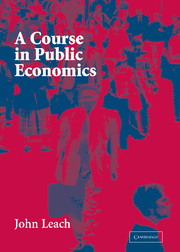Book contents
- Frontmatter
- Contents
- List of Figures
- Preface
- 1 Introduction
- Markets
- Externalities
- Public Goods
- Imperfect Competition
- Taxation and Efficiency
- Asymmetric Information and Efficiency
- Asymmetric Information and Income Redistribution
- 23 The Distribution of Income
- 24 The Limits to Income Redistribution
- 25 Redistributing Income through Tagging and Targeting
- 26 The Role of Government in a Market Economy
- A Note on Maximization
- References
- Index
26 - The Role of Government in a Market Economy
from Asymmetric Information and Income Redistribution
Published online by Cambridge University Press: 06 July 2010
- Frontmatter
- Contents
- List of Figures
- Preface
- 1 Introduction
- Markets
- Externalities
- Public Goods
- Imperfect Competition
- Taxation and Efficiency
- Asymmetric Information and Efficiency
- Asymmetric Information and Income Redistribution
- 23 The Distribution of Income
- 24 The Limits to Income Redistribution
- 25 Redistributing Income through Tagging and Targeting
- 26 The Role of Government in a Market Economy
- A Note on Maximization
- References
- Index
Summary
Competitive markets have contributed greatly to our material well-being, but they are not without their flaws. A still higher level of material welfare can be obtained if the government operates in consort with the market system, mending its flaws and moderating its harsher tendencies. The government has two well-defined functions in this partnership.
The government's first potential role follows from the observation that actual economies do not satisfy the requirements of the first theorem. Since this theorem describes the least restrictive conditions under which competitive markets are efficient, actual market economies must be inefficient. The allocation of resources in a market economy is imperfect, and the government might be able to improve it.
The second function follows from the observation that competitive markets can give rise to very unequal distributions of material welfare. There is a broad consensus in many societies that extremely unequal distributions are undesirable. Such extremes can be partially mitigated by charitable acts on the part of the rich, but charity has the attributes of a public good, and hence will be underprovided. If a consensus in favour of redistribution exists, adequate redistribution can occur only through government action.
REPAIR OF MARKET FAILURES
There are two ways in which the government can attempt to improve the allocation of resources: it can provide goods and services directly, and it can make laws that alter market outcomes.
- Type
- Chapter
- Information
- A Course in Public Economics , pp. 390 - 394Publisher: Cambridge University PressPrint publication year: 2003



